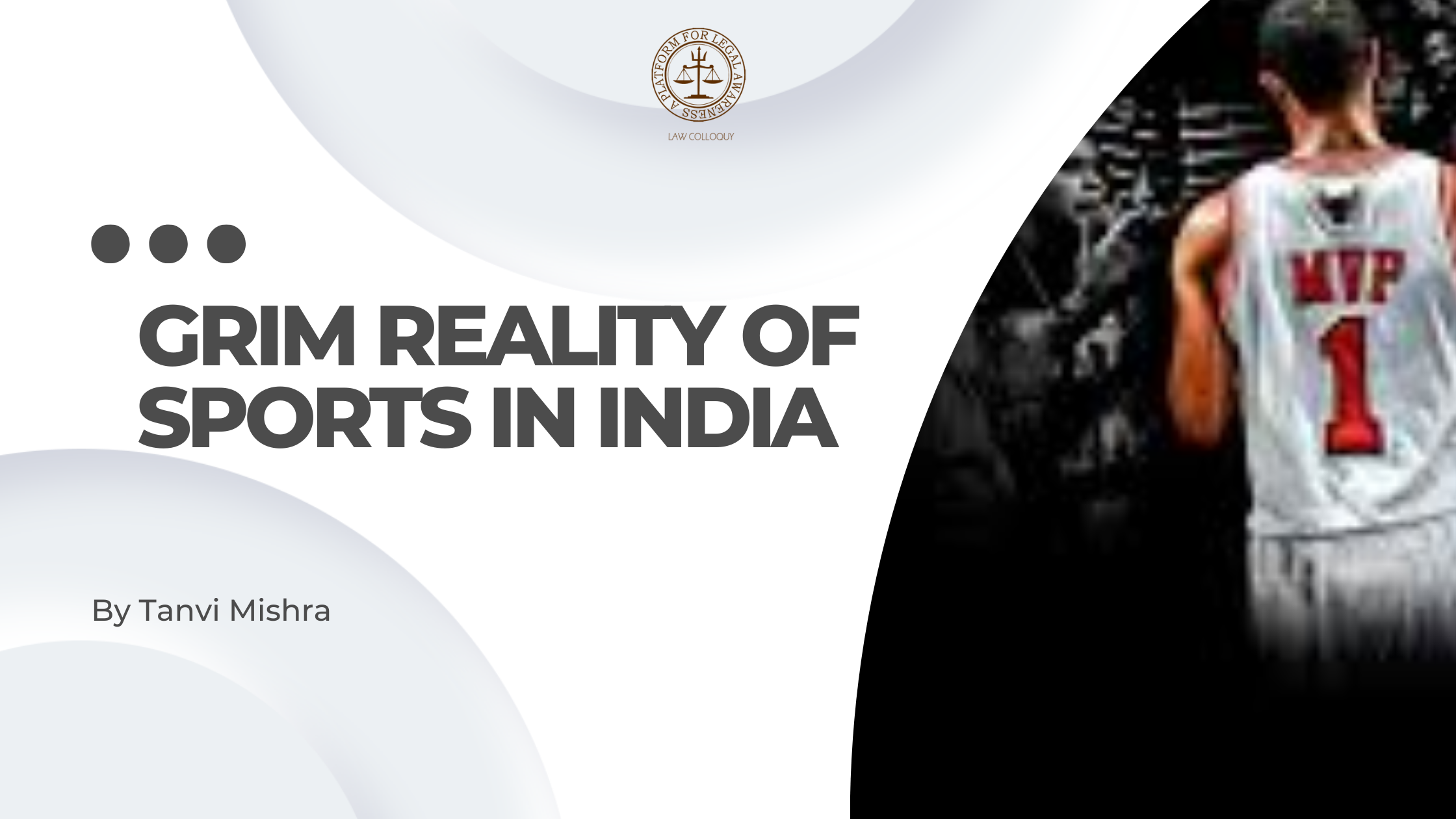The Supreme Court Said That The Marriage Certificate Issued By Arya Samaj is Illegal: Explainer
The Supreme Court declared the marriage certificate issued by Arya Samaj is illegal. A marriage certificate is a document that declares two people married legally. In India marriages are register in two ways; either, under the Hindu Marriage Act, 1955 or the Special Marriage Act, 1954. Honorable Supreme Court in the year 2006, made it mandatory in India to get a marriage registered to legalize it. This blog explains the validation of marriage certificate and procedure of registration of marriage in India.
GRIM REALITY OF SPORTS IN INDIA
Sport refers to an activity that involves physical and mental abilities. Sports have always been a vital part of human lives. Sports in India range from traditional, common, and famous sports like kabaddi, cricket, hockey, etc., and some other sports which are not known to many people. India has performed tremendously in the realm of sports and has been hosting plenty of domestic and international sports events as well. It has earned many awards in global spaces like the Olympics, commonwealth games, etc. In addition, India encourages the youth and has opened various universities for the same.Despite everything, India still lacks in the area. India faces problems that are still unrecognized and are not acted upon, even if recognized. The roots of the issues are hard to reach consideration yet can be done. The problems start and keep going on and probably never end. However, recognition is our duty, and acting on them is our right; hence let us move on to the grim reality of sports in India.
The Police Commissionerates System in Bhopal & Indore- Explainer
Before independence, the commissioner system was in force during the British era. It was adopted by the Indian Police after independence. This system is presently applicable in more than 72 metros of the country. Under Part 4 of the Indian Police Act, 1861, the District Officer has certain powers to exercise control over the Police. In this, the Code of Criminal Procedure (CrPC) gives certain powers to the Executive Magistrate for the smooth running of Law and order. Indore is the most populated city of M.P. with a population of 32.72 lakh, while Bhopal is the fifth most populated District with a population of 23.68 lakh as per the census of 2011. Madhya Pradesh Chief Minister Shivraj Singh Chouhan on November 21 announced the implementation of a police commissioner system in the two cities of M.P., Bhopal and Indore, referring growing population and geographical expansion of the two cities and the accompanying administrative and Law & order problems. This blog explains the The Police Commissionerates System and procedure in brief.
Central Public Information Officer, Supreme Court of India v. Subhash Chandra Agarwal: Right to Information and Judicial Independence
The citizen’s Right to Know is one of the significant ingredients of a democratic country. India demands transparent and accountable government to establish open and good governance. The sovereignty of India lies with ‘the people of India’. We choose our own representative therefore; it is our right to know about the machinery of the country. The need to control the mal administration of the government is important. Right to Information Act was formulated in 2005 which comes within the ambit of Article 19(1)(A) of the Constitution of India which ensures the fundamental right to Freedom of Speech and Expression. Many landmark judgments elaborated and clarified the concept of open governance. In the modern era, people are more vigil about their rights and they constitute the democracy. So, they expect the government to deliver. Central Public Information Officer, Supreme Court of India v. Subhash Chandra Agarwal, 2019, it was held by the Constitution Bench of Supreme Court that Supreme Court comes under the scope of “public authority”. Therefore, it is covered under Right to Information Act, 2005 (RTI Act). It is one of the landmark judgments which took a limelight in recent years.
RIGHT TO INFORMATION WITH SPECIAL EMPHASIS ON RIGHT TO PRIVACY IN INDIA
“Information is the currency of democracy,” is very rightly said by Thomas Jefferson. Right to Information is the foundation of a democratic government. In India, democracy vests with the people of India, so we have a right to know. The Right to Information Act, 2005 was formulated which replaced the Freedom of Information Act, 2002. Privacy and RTI are related to each other. The government is accountable to the people in open governance system. In modern era, the people are more aware about their rights as well as their privacy. India’s legal system is formulating various statutes, acts and legislations to make the government accountable and transparent but the concept of privacy runs parallel to RTI. The law provides us the right to access the information held by government authorities on the other hand, the right to privacy ensures the confidentiality to access, collect and usage of personal information about them that is held by governments and private bodies. These two laws are contradictory and complicated.
Nature & Significance of Law
Law has become a significant medium for every civilized nation. Theory and philosophy of law is called jurisprudence. Jurisprudence should always be the foundation for framing rules and laws of a nation. Law is a dynamic subject which changes with the changing needs of the society. Philosophers and Jurists have come up with different definitions of law in different eras. Nature of law has also been propounded differently by different jurists. John Locke's theory on Constitutionalism is worth mentioning in present day context because the theory of Constitutionalism is associated with the noble idea which means freedom from arbitrary government . This concept encourages protection/promotions of rights of people, rule of law and accountable governmental procedures. A country which lacks constitutionalism is a dangerous sign which should always be discouraged.
Online Dispute Resolution: The Future of Dispute Resolution
The traditional litigation recourse is expensive as well as time-consuming. Our judiciary is already burdened with a plethora of pending cases which require a mechanism that aids in quick disposal of cases and effective justice delivery system. The Alternative Dispute Resolution methods have been quite beneficial to cope up with the pending cases prior to the pandemic.
‘Evaluation of the working of Reformative theory in India’
Reformative theory of punishment is widely being accepted and implemented theories of punishment around the world. It is backed by the ideology that prisons should be converted into reformed homes. The motives behind the offences must be examined; there should be made a way so that the offender could go back to mainstream society.






